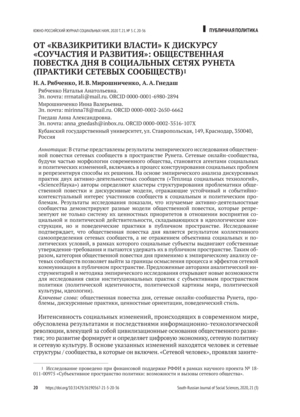Abstract
The article presents the results of an empirical study of the public agenda of network communities in the Runet space. Online communities as part of the morphology of modern society become agents of social and political change, including in the process of constructing social problems and representing ways to solve them. Based on an empirical analysis of discursive practices of two online communities (“The Greenhouse of Social Technologies”, “Science | Science”), the authors determine clusters of structuring the problems of the public agenda and discursive models that reflect sustainable and contextual interest of community members in social and political problems. The results of the study showed that the studied online communities demonstrate different models of the public agenda, which represent not only the system of their value priorities in relation to the perception of social and political reality that take shape in ideological constructions, but also behavioral practices in public space. The study confirms that the public agenda is the result of collective self-determination of network communities, and not a reflection of objective social and political conditions, in which social actors put forward their own claims, claims and try to keep them in public space. Thus, the category of public agenda applicable to the empirical analysis of network communities allows you to go beyond the boundaries of understanding the process and effects of network communication in public space. The analytical tools and methods of empirical research proposed by the authors open new possibilities for studying the relationship between institutional practices and the subjective space of politics (political identity, political picture of the world, political culture, ideology).
Keywords
Funding information
The research is given a financial support by The Russian Foundation for Basic Research, the research project No 18-011-00975 entitled “Subjective space of politics: opportunities and challenges of network society” (2018–2020).
References
Дьякова, Е.Г. (2003). Массовая политическая коммуникация в теории установления повестки дня: от эффекта к процессу. Полис. Политические исследования, 3, 109–119.
Лапкин, В.В., Семененко, И.С. (2013). «Человек политический» перед вызовами «infomodernity». Полис. Политические исследования, 6, 64–81.
Мирошниченко, И.В. (2016). Сетевая публичная политика и управление: Монография. М.: АРГАМАК-МЕДИА.
Мирошниченко, И.В., Рябченко, Н.А., Гнедаш, А.А. (2019). Поляризация дискурсивного пространства (на примере хэштэга #RUSSIA в социальной сети TWITTER). Каспийский регион: политика, экономика, культура, 1(58), 53–62.
Морозова, Е.В., Мирошниченко, И.В., Рябченко, Н.А. (2016). Фронтир сетевого общества. Мировая экономика и международные отношения, 60(2), 83–97.
Найбет, Т., Рода, К. (2009). Виртуальные социальные пространства: подходы, практики, перспективы. Социологический ежегодник: сб. науч. тр. М.: РАН.
Романов П.В., Щебланова, В.В., Ярская-Смирнова, Е.Р. (2003). Женщины-террористки в интерпретативных моделях российских СМИ (Дискурс-анализ газетных публикаций). Полис. Политические исследования, 6, 144–154.
Романов, П.В., Ярская-Смирнова, Е.Р. (2005). Социология профессий: аналитические перспективы и методология исследований. М.: Вариант.
Рябченко, Н.А., Гнедаш, А.А. (2014). Online и offline социальные сети: к вопросу о математическом обосновании стохастической модели функционирования. Политическая Экспертиза: ПолитЭкс: журнал, 3(22), 91–100.
Рябченко, Н.А., Катермина, В.В., Гнедаш, А.А., Малышева, О.П. (2018). Политический контент социальных движений в online-пространстве современных государств: методология анализа и исследовательская практика. Южно-российский журнал социальных наук, 3, 139–162.
Ярская-Смирнова, Е., Романов, П. (ред.) (2009). Визуальная антропология: настройка оптики. М.: Вариант, ЦСПГИ.
Barney, D.D. (2004). The Network Society. Cornwall: Great Britain by MPG Books.
Blattberg, C. (2009). Political Philosophies and Political Ideologies. Patriotic Elaborations: Essays in Practical Philosophy. Montreal: McGill-Queen’s University Press.
Castells, M. (2000). The Rise of The Network Society: The Information Age: Economy, Society and Culture. N.Y.: John Wiley & Sons.
Castells, M., Cardoso, G. (Eds.) (2005). The Network Society: From Knowledge to Policy. Washington, DC: Johns Hopkins Center for Transatlantic Relations.
Djik, V.J. (2001). The Network Society: Social Aspects of New Media. Houten: Bohn Staflen Van Loghum.
Hall, S. (1997). The Work of Representation. Representation: Cultural Representations and signifying practices. New Dehli.
Hall, S. (2001). Encoding/Decoding. Media and Cultural Studies. KeyWorks. London: Blackwell Publishers.
Hammersley, М. (2003). Conversation Analysis and Discourse Analysis: Methods or Paradigms? Discourse & Society, 14(6), 751–781.
Jones, R.H., Chik, A., Hafner, C.A. (Eds) (2015). Discourse and Digital Practices: Doing Discourse Analysis in the Digital Era. N.Y.: Routledge.
McCombs, M., Shaw, D. (1972). The Agenda-Setting Function of Mass-Media. Public Opinion Quarterly, 36, 176–187
Minar, D. (1961). Ideology and Political Behavior. Midwest Journal of Political Science, 5(4), 317–331.
Mullins, W.A. (1969). The Concept of Ideology: An Analysis and Evaluation. Washington: University of Washington.
Spector, M., Kitsuse, J. (1987). Constructing Social Problems. N.Y.: Hawthorne.
Van Dijk, Teun A. (2009). Society and Discourse: How Social Contexts Influence Text and Talk. Cambridge: Cambridge University Press.
Walford, G. (1990). Beyond Politics. An Outline of Systematic Ideology. London: Calabria Press.
WebCanape (2019). Вся статистика Интернета на 2019 год — в мире и в России. Режим доступа https://www.web-canape.ru/business/socialnye-seti-v‑2018‑godu-globalnoe-issledovanie/
Wodak, R. (Ed.) (1989). Language, Power and Ideology: Studies in Political Discourse. Philadelphia: John Benjamins Publishing.
Wong, S., Altman, E., Rojas-Mora, J. (2011). Internet Access: Where Law, Economy, Culture and Technology Meet. Computer Networks, 55(2), 470–479.


